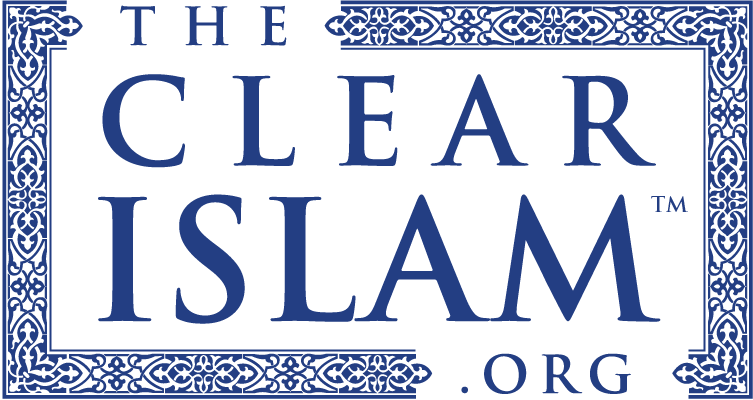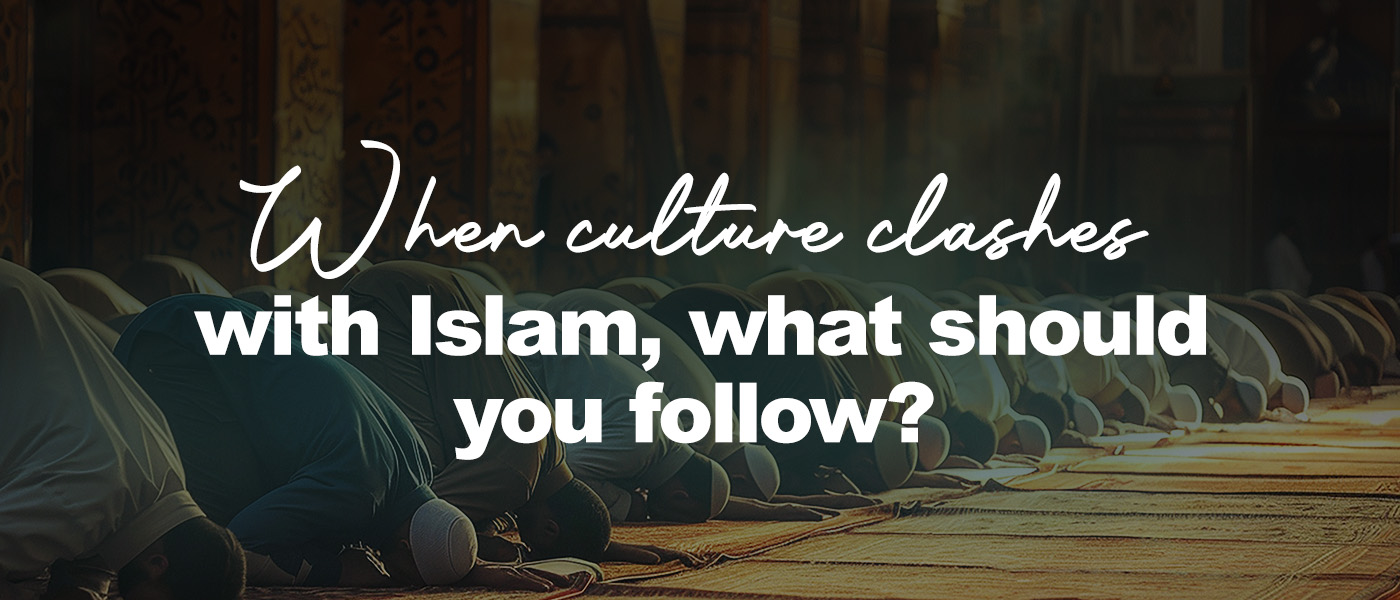In every society, human beings live by two invisible forces: culture and religion. Both shape how we think, behave, and belong. Both offer guidance, meaning, and a sense of order. But while they often coexist in harmony, there are moments, sometimes quiet, sometimes explosive, when they clash. Culture is the set of customs, values, behaviors, and shared assumptions passed down through generations. It includes everything from how we greet one another to how we marry, mourn, raise children, and resolve conflict. It is deeply emotional, largely unconscious, and fiercely defended. Culture is not chosen, it is absorbed. Religion, by contrast, is revelation. It is deliberate, divine, and eternal. Islam is not simply one element of a Muslim’s cultural identity. It is a total worldview, revealed by Allah (SWT), that calls for unconscious submission to something higher than heritage, sentiment, or social expectation. Unlike culture, Islam is not inherited passively. It must be understood, internalized, and practiced with intention.
In theory, culture and religion can support each other. Islam has always embraced cultural diversity, as long as it does not compromise tawheed or moral boundaries. But in practice, culture can become so dominant, so deeply woven into our sense of right and wrong, that it begins to override what Allah (SWT) has actually revealed.
This is not merely an academic distinction. It is a crisis of identity, authority, and allegiance that plays out in Muslim communities every day. A daughter is denied the right to choose her spouse because of ethnic expectations. A son is pressured into cultural rituals he knows have no basis in the Sunnah. A convert is welcomed into Islam but not into the community. A family insists on celebrating milestones in ways that prioritize reputation over righteousness. These are not small matters of “preference.” They are signs of a deeper confusion: when Islam and culture disagree, who do you obey? Your heritage, or your Creator?
This question is not new, and nor is it difficult to answer; however, we find that some people still find it difficult to choose between. The Quran has repeatedly challenged those who blindly follow their forefathers. The Prophet (SAW) himself was sent to a people who resisted revelation in defense of tribal norms and inherited customs. The early Muslims had to choose between what they knew and what Allah (SWT) had revealed, and often at great personal cost. Today, the struggle has returned in quieter but no less significant forms. It appears in wedding halls, family expectations, social norms, and unspoken community rules. And for many Muslims, especially the youth and converts, the pressure to conform to culture is louder than the call to submit to Allah (SWT).
This blog article seeks to examine that tension. Not to vilify culture, but to understand its place, its limits, and its influence. Through Quranic reflection, prophetic guidance, and contemporary realities, we ask the central question: when culture clashes with Islam, what should you follow, and why does your answer matter?
What does Islam’s relationship with culture look like? What do the preservation, refinement, and boundaries look like?
To begin, it must be understood that Islam does not seek to erase culture. Rather, it recognizes cultural diversity as a divine sign. Allah (SWT) says, “O humanity! Indeed, We created you from a male and a female, and made you into peoples and tribes so that you may get to know one another. Surely the most noble of you in the sight of Allah is the most righteous among you. Allah is truly All-Knowing, All-Aware.” (The Clear Quran®, 49:13)

existence of different cultures, ethnicities, and social traditions is not a flaw of humanity, it is part of Allah’s (SWT) design. Cultural expressions such as language, dress, food, and art are not only permissible but are part of what makes the Ummah richly diverse.
However, Islam draws a clear line: culture is acceptable, as long as it does not contradict Islamic principles. When it does, it must be abandoned. This is where Islam’s refinement role comes in. The Prophet (SAW) did not reject all pre-Islamic Arab customs, he retained many that were harmless or praiseworthy (such as hospitality, eloquence, tribal solidarity when used justly). But he also reformed or outrightly abolished practices that conflicted with the message of Islam.
Among those abolished were:
- The burying of infant daughters (a practice stemming from shame-based culture).
- Tribal arrogance and ethnic superiority.
- Inheritance laws and that excluded women.
- Superstitions and rituals tied to shirk (associating partners with Allah (SWT)).
The problem of blind cultural loyalty
One of the strongest warnings in The Quran is directed at those who cling to culture at the expense of revelation. Allah (SWT) says, “When it is said to them, ‘Follow what Allah has revealed,’ they reply, ‘No! We only follow what we found our forefathers practicing.’ Would they still do so, even if their forefathers had absolutely no understanding or guidance?’” (The Clear Quran®, 2:170)

This verse captures the fundamental nature of blind cultural loyalty – an emotional, uncritical attachment to inherited practices, regardless of their truth or consequences. It exposes a psychological truth that still applies today: people often conflate ancestral authority with moral authority. To follow one’s parents, elders, or community customs is not inherently wrong. But when those customs violate the clear guidance of The Quran and Sunnah, obedience to anyone other than Allah (SWT) becomes spiritually dangerous. The Prophet (SAW) has taught us, “There is no obedience to the creation in disobedience to the Creator.” (Musnad Ahmad)
This is a critical ethical principle. Our loyalty to family, tribe, or nation must never supersede our loyalty to Allah (SWT) and His Messenger (SAW).
Real-world examples of how culture competes with Revelation
To make this issue more concrete, consider how culture competes with Islam in several contemporary scenarios. One of the most painful areas of cultural interference is in marriage. Many Muslim families refuse marriage proposals not on the basis of religion or character, but race, nationality, or social class. This is explicitly condemned in the Sunnah. The Prophet (SAW) said, “If someone whose religion and character you are pleased with comes to you [seeking marriage], then marry him.” (Sunan al-Tirmidhi)

Yet, in many cases, parents impose cultural restrictions under the guise of “compatibility” or “family honor.” This is not Islam. This is ‘asabiyyah, tribalism, which the Prophet (SAW) warned against, “He is not of us who calls to ‘asabiyyah (tribalism), or fights for ‘asabiyyah, or dies for ‘asabiyyah.” (Abu Dawud)
Further, cultural rituals surrounding weddings, births, and deaths often include superstition, extravagance, or even actions rooted in shirk. The Prophet (SAW) has said, “Whoever introduces into this matter of ours that which is not from it, it is rejected.” (Sahih Bukhari) Islam is not opposed to joy or mourning, but it requires that such expressions stay within the ethical and theological framework revealed by Allah (SWT).
Finally, many cultures enforce harmful or unjust gender expectations under the banner of tradition, whether in how women are educated, employed, or treated within the home. Islam, on the other hand, came with a message of spiritual equality and moral accountability for both men and women. Allah (SWT) says, “Whoever does good, whether male or female, and is a believer, We will surely bless them with a good life, and We will certainly reward them according to the best of their deeds.” (The Clear Quran®, 16:97)

Where culture restricts what Allah (SWT) has made lawful, or permits what Allah (SWT) has forbidden, it must be challenged.
What is the role of the Muslim individual in reforming culture?
The answer is not to cancel culture, but to reform it. This is a prophetic legacy. The Prophet (SAW) reformed his society through gradual teaching, moral consistency, and personal example. For today’s Muslims, especially those caught between the expectations of elders and the call of faith, this means:
- Gaining knowledge of Islamic rulings in key areas of life.
- Communicating with wisdom and patience, particularly with parents or community leaders.
- Upholding principles without arrogance or hostility.
- Distinguishing between Islam and inherited culture, so that we do not conflate the two.
We must recognize that Islam calls to be moral agents, not passive inheritors of tradition.
At the end of it all, we must only follow Allah (SWT) & what pleases Him
The cultural inheritance of a people can be a source of beauty, identity, and community. But it can also become a barrier, a veil, between the Muslim and their Creator. When that happens, a choice must be made. And in that moment, we are not the first to choose. Prophet Ibrahim (AS) chose revelation over his father’s religion. Bilal ibn Rab’ah (RA) chose the oneness of Allah (SWT) over the chains of tradition. The Prophet (SAW) chose truth over tribal customs, even when it meant being ostracized by his people.
To follow Islam over culture is not to reject your roots at all! It is to purify them. To return them to their rightful place – secondary to revelation, subordinate to the will of Allah (SWT). Allah (SAW) says in The Quran, “Say, Surely my prayer, my sacrifice, my life and my death are all for Allah—Lord of all words.” (The Clear Quran®, 6:162)

This is the moral courage Islam calls for. And it begins with asking yourself one honest question: which part of me is Islam, and which part is just a habit dressed as religion?
Dua
Oh Allah! Cause my faith to reach the most perfect faith, make my certainty the most excellent certainty, and take my intention to the best of intentions, and my works to the best of works! Oh Allah! Cause good to flow at my hands for people, and do not let it be lost through reproach! Oh Allah! Grant me the highest moral traits, and protect me from vanity!
Oh Allah! Do not raise me a single degree before the people without lowering me an equal amount in myself, and do not bring about an outward exaltation for me without causing an inward abasement in myself to the same measure!
Oh Allah! Establish me among my family, children, kin, and neighbors in a way that beautifies my rank, and completes Your blessing upon me, and keeps evil away from me! Oh Allah! Make me one who is grateful and remembering You, and satisfied with Your blessings upon me, and desirous of what is with You!
Oh Allah! My loved ones, those close to me, and those connected to me, place them under Your protection, and in Your shade, and in Your safeguard, and grant them refuge from every rebellious Shaytan, and every tyrannical oppressor, and from the evil of every evildoer, for indeed, You have power over all things!


